Traditional PR Is Dead. Comms+ is Here
Alex Daly and Ally Bruschi are building a best-in-class modern comms practice.
Alex Daly and Ally Bruschi are building a new kind of PR company. It all started with the question: What is comms today? Because the media (like the world) is changing rapidly and constantly, industries like PR that work directly with the media need to change alongside it.
Today, PR is much more than just pitching stories to the same rolodex of media contacts. Clients need guidance on building their comms strategies from the ground up, from setting up affiliate marketing, to sourcing brand partnerships and engaging influencers, to media training and spokesperson development, to building a solid launch strategy, and…and…and…
Daly has evolved in that direction. It’s no longer just PR. It’s Comms+. Their team comes from a wide range of professional backgrounds including film, crowdfunding, publishing, social media, and journalism — which means they understand what makes a good story, a good pitch, and good comms. And in today’s world of saturated media, that makes all the difference.
Here, Alex and Ally share their new direction; how Daly cuts through the noise; and how they reach beyond the standard PR playbook to make a sustained impact (plus some magic) with their clients across categories, including OLLY, Freitag, Parable, Penguin Random House, and many more.
What led to the new Comms+ direction?
Alex: This decision wasn’t just about expanding our services, but about changing the way we're positioning ourselves. We previously called ourselves a “comms & marketing agency” and that caused confusion about what services we really offered. We had people coming to us for paid marketing campaigns, digital ads, and celebrity partnerships, and we had to keep saying we didn’t do that type of marketing.
Repositioning as Comms+ now firmly roots us in the comms ecosystem and makes us really stand out there, versus making it seem like we’re a half-hearted part of a marketing agency that doesn't actually provide those services. This positioning shift has made it clear both internally for our team, and externally for our clients and other partners.
Ally: At other PR agencies — and companies generally — different roles and services have become so siloed. With our Comms+ approach, we show how all of these functions are actually overlapping and can be integrated into a single and holistic scope. We’ve had clients come to us for just media relations, but when we heard they were also planning to hire affiliate marketing partner, we said: Rather than hiring another agency, let us do that work for you, too. Because in the end, that affiliate work ideally needs to be done in tandem with your media relations strategy, in order to establish consistency for the brand.
You say the old PR playbook is no longer relevant these days. What has changed?
Alex: The concept of showing your tangible value in the world of PR has always been an inherent challenge. And because of that, PR people have a bad rap. But we don’t like to even use the word PR because we think our job is more about how you communicate — hence, comms — across platforms: internally with your employees and stakeholders, and externally with customers, on social media and in email marketing and newsletters. PR is dead, but comms will be here forever, and we think that Comms+ is even one step ahead of that.
The reputation of PR reminds me of when I used to write for Delta Sky magazine. It stopped publishing during the pandemic, and yet I still get pitched celebrity stories for it. That’s where I shake my head and think, Does your client know you’re pitching a mag that hasn’t existed in three years?
Ally: When it comes to reporters and influencer relationships, a lot of agencies rely on hitting up their “rolodex” of contacts, and recycling old lists over and over again, which leads to...exactly what you described.
Our team does a fresh round of deep market research for every new client campaign, because we know writers jump around publications or their beat changes on a regular basis. We want to make sure we create pitches that have a sense of connection with the person we’re pitching. We take a personalized approach for every list, and every pitch.
Alex: Yet, despite this, we consistently see bigger corporate companies keeping their old agencies on retainer for decades — not necessarily because they’re doing a great job, but because they’re resistant to change.
When these companies meet us, we look like the cool little sister agency that they’re intrigued by, but skeptical that we can have the same impact as their existing, corporate agency. But when we start talking about the niche, tailored approach that Ally just mentioned, their eyes light up. And that’s when they see that, if they can be open to changing things up and trying to do things differently, it can have a huge impact on their business.
The best clients — big and small, legacy and startups alike—are those that trust us and are excited to change.
What are your company's ambitions?
Alex: One of our company values is intimacy, and I don't see our team size becoming huge because we will lose that sense of intimacy. We want to grow sustainably, and stay true to our values — as well as how we work, and who we work with. Our hope will be to become even more discerning about what type of clients we engage, focusing on companies that are making the world a bit better in their own way.
In our updated new business screening process, we have an evaluator where we ask about budget, goals, and categories, as well as if the client’s mission is aligned with ours. Are they open to questions such as, What is your DEI commitment? And, if it's not great, can we help you get there?
Ally: Our new Comms+ positioning also allows us, as we grow, to continue to make our team robust generalists who have their specialization and unique skills. And they are excited to work on all different types of projects, scopes and services. So, we can increase our impact and revenue without having to become a team of 40.
As robust generalists with unique skills sets, how do you position yourself with clients in niche industries?
Alex: We use this in our new business conversations because we do get that question a lot. We have people who come to us who are far into their niche industry—whether that’s health tech or SaaS or supplements—and they ask us why they should work with us over a more hyper-specialized PR agency who only works within their industry.
We always like to respond to this by saying: Our more generalist approach is actually going to be to your advantage. Those niche, specialized agencies might have the right media contacts to tell your story to its most obvious, specific audience, but telling your story to just one audience is not enough anymore.
The fact that our team brings such a diversity of expertise, professional backgrounds, and client experiences to the table is a huge advantage for clients in any industry, because it means we aren’t stuck with telling a single version of the client’s story to a single audience. We’re able to lean into one of our four core values—pivoting—to share different versions of a client’s story that will appeal to various audiences.
Most firms stay in their wheelhouse, but we offer something different.
What do you offer clients to cut through the noise?
Ally: Achieving top-tier press doesn't happen overnight and needs to be built from the bottom up. So, we place a heavy value on niche press—smaller, non-traditional outlets with engaged audiences that the general population may not be as familiar with — whether that's a Substack, industry blog, TikTok page, YouTube channel, or something else.
Not only do niche stories help build brand awareness, but they further define a brand's story and create connections with potential customers—one view at a time. We believe that little mentions add up to the big ones and niche media should be valued in a strategy alongside top-tier outlets. And we have the proof: We can draw on our success stories to show clients how the impact of being on an influential albeit niche blog can sometimes be greater for them than being the 50th story to publish on a big deal tech publication that day.
If you’d like to read more from Creative Factor, start here.


